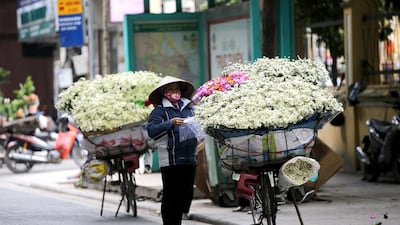Although the country's oil production peaked a decade or so ago, Vietnam has been a net exporter of energy until this year.
Now the South East Asian powerhouse is exploring new oilfields in the South China Sea - but activity has suffered a number of delays as Vietnam has clashed with China over resource exploration.
Drilling at a Vietnam block was suspended after pressure from China, which said that the concession operated by Spain's Repsol overlapped a waterway it claimed as its own. Vietnam was alarmed, too, when Beijing reacted to an international tribunal's rejection of China's claims over the South China Sea by ignoring the judgement.
Such clashes are expected to diminish, however, in the the light of deepening economic relations between the two. China is Vietnam's biggest single trading partner.
August marked the first month in which Vietnam became a net importer of crude oil as the country boosted fuel refining at a time when local oil output is dwindling, according to Reuters. The trend is set to continue in coming months as the country’s refinery capacity grows, analysts say.
This surge in overseas orders for crude comes as Vietnam's 200,000 barrels per day Nghi Son refinery, its second such facility, prepares to produce liquefied petroleum gas, petrol, diesel, kerosene and jet fuel, mainly for the domestic market, with officials looking at a start date later this year or in early 2018.
With local oil production stalling and given Vietnam's more than 90 million people and 6 per cent plus annual economic growth, demand for oil imports will continue to grow, especially from current principal suppliers such as Kuwait, Azerbaijan and Brunei.
“We expect to send bigger and more frequent volumes of crude to Vietnam in the future," Reuters quoted a senior oil trading executive as saying. "Vietnam is one of the key new centres of oil demand growth, and we would not want to miss this opportunity,” the official added.
Kuwait Petroleum International and Japan’s Idemitsu Kosan each own 35 per cent of the Nghi Son refinery, while state-owned PetroVietnam holds a 25 per cent stake and Japan’s Mitsui Chemicals 4.7 per cent. Kuwait was the first supplier of crude oil to the new facility, sending 2 million barrels in August on a supertanker, with its oil minister saying in July that it expected to send regular shipments to Vietnam.
Vietnam is at the same time hoping to step up its exports of goods to Middle East nations. As reported in The National in August, a conference on Vietnam-Middle East business cooperation was held in Hanoi during that month, drawing more than 40 leading Vietnamese export firms.
_____________
Read more:
‘America first’ could lead to Gulf states turning eastwards
Ultratravel cityguide: Hanoi, Vietnam
Emirates begins daily flights from Dubai to Myanmar and Hanoi
_____________
The country plans to increase exports to the Middle East, said Nguyen Xuan Cuong, the country's minister of agriculture and rural development, during the event. The Middle East is a huge market and a gateway to the European market, he noted. Vietnam hopes to export agricultural produce such as rice, tea, coffee, peppercorn, rubber, cashew, fruit and aquaculture products, to the 400-million person market of Middle East in 16 countries.
An early mover on the potential of exports from Vietnam to the UAE was Emirates' freight arm Emirates SkyCargo. It has played a key role in strengthening trade links in perishables between Vietnam and the UAE. Over the past 18 months, the carrier has facilitated a near five-fold increase in the volumes of exports of fruits, including rambutans and lychees, from Vietnam to Dubai.
Last year, Vietnam's agro-forestry-fishery exports were valued at over US$32 billion. Emirates SkyCargo has been working with Vietrade - Vietnam's trade promotion agency - to help develop export opportunities for Vietnamese produce in international markets, specifically in the UAE and other parts of the Middle East.
The volume of perishables exports from Vietnam to Dubai has increased considerably, touching a record of close to 110 tonnes in January 2017, according to SkyCargo.
"Emirates SkyCargo started operations in Vietnam in 2008 and has since then played an important role in the growing trade between Vietnam and the UAE. By working closely with Vietrade and by building upon our expertise in shipping perishables, we developed air freight solutions that have helped increase the exports of premium fruits and vegetables from Vietnam to Dubai," said Ravishankar Mirle, the Emirates vice-president, cargo commercial, Far East and Australasia.
"We will work with our customers and stakeholders to promote and develop new trade lanes for exports from Vietnam to global markets," he added.
Mr Cuong pointed out, however, that trade revenue between the two sides remains lower than hoped for, mainly owing to difficulties in payments as transactions are handled primarily via intermediary banks in Dubai, China and Singapore as well as some European countries, involving high transaction costs.

